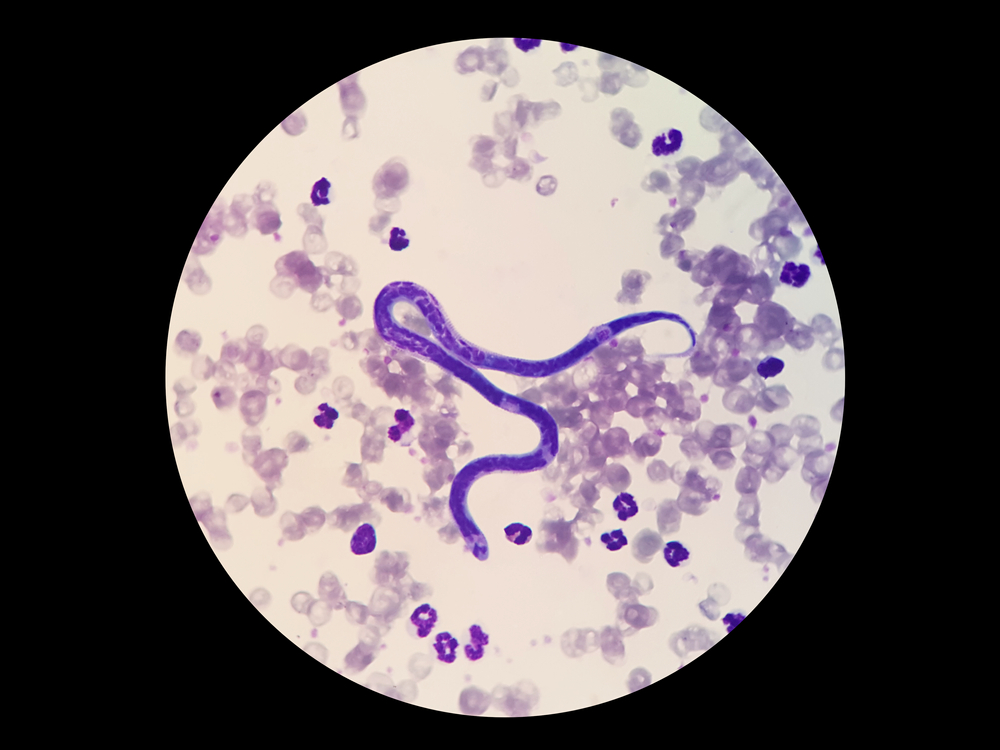If you have questions about heartworms, Providence Vet has answers. Spring is here, and parasites and insects are becoming more active. It’s time to test your knowledge about heartworm disease and prevention with our “Facts From the Heart” heartworm quiz. See the questions below, followed by answers from our expert veterinary hospital staff. (Don’t look ahead and cheat!)
- True or false?
Adult heartworms are microscopic worms that live in the heart and lungs of cats and dogs. - Multiple choice: Dogs get heartworms from:
- Nearby heartworm positive dogs
- Infected wildlife
- Mosquito bites
- True or false?
Cats can also contract heartworm disease. - True or false?
If I miss giving their preventive and my dog has heartworms, I will know something is wrong right away. - Multiple choice: Heartworm testing in dogs is:
- Stressful
- A quick, affordable, low-stress test
- Costly
- Multiple choice: Heartworm treatment for pets is:
- Prolonged, complicated, and costly
- Simple and quick
- Inexpensive
- True or false?
The prognosis for pets with heartworm disease is always poor. - Multiple choice: Heartworm prevention for dogs and cats is:
- Simple
- Readily available
- 100% effective
- All of the above
See below our answers and explanations:
- Answer = False
While the immature heartworm larval form is microscopic, adult heartworms can grow up to a foot long. These spaghetti-like worms gather in the pet’s heart and lungs, where they cause inflammation and block blood flow. - Answer = C
The most accurate answer is from mosquito bites. Although neighboring dogs who aren’t on a heartworm preventive and nearby wildlife can harbor heartworms, a mosquito must bite your pet to transmit heartworms. Mosquitoes take in heartworm larvae through a blood meal from an infected animal, transmitting the infective larvae when they bite your pet to obtain another blood meal. The heartworm larvae then migrate over a six-month period to your pet’s heart, where they become adults, and produce more heartworm larvae. - Answer = True
Since cats are not the preferred hosts for the heartworm parasite, they usually only harbor two to three worms—whereas dogs can carry hundreds. Heartworm-infected cats show a wider range of signs, and may vomit, lose weight, cough, or struggle to breathe, as they develop heartworm-associated respiratory disease (HARD). Sometimes, without warning, heartworm-infected cats suddenly die. - Answer = False
Heartworm disease progresses slowly in dogs. A heartworm-positive dog who carries adult worms in their heart and lungs may show no symptoms at first, but will begin to cough, have decreased exercise tolerance, and lose weight as the number of adult worms increases and infection becomes more severe. Eventually, dogs display abdominal distension from the fluid build-up of heart failure. - Answer = C
Our expert veterinary team can perform a 10-minute pet-side heartworm antigen test that uses only a few drops of your dog’s blood and reveals the presence of adult worms in your dog’s heart. If your dog tests positive for heartworms, further investigation, such as blood work, urinalysis, X-rays, or ultrasound, will be needed to determine their disease stage and severity. The testing and staging process can be more complicated for suspected heartworm-positive cats. - Answer = A
Unfortunately, this is the most accurate answer. For each dog and cat we diagnose, we develop a customized heartworm treatment plan, which will vary depending on the pet’s physical condition and disease stage. The following treatment steps may occur over several months: -
- Administering an antibiotic to weaken the worms
- Administering a microfilaricide to kill the immature forms of the worms
- Administering an anti-inflammatory to decrease the pet’s reaction
- Administering injections to kill the adult worms
The most important component of heartworm treatment in dogs is strict exercise restriction. Kennel rest with leash walks only is best throughout the treatment process, because keeping your dog’s heart from pumping fast is the best way to decrease their chance of a severe, life-threatening complication called thromboembolism.
No safe heartworm treatment is available for cats. We medicate heartworm-positive cats to make them more comfortable.
- Answer = False
Dogs with stage one or two heartworm disease have a good prognosis for recovery, and the damage to their heart and blood vessels can heal with treatment and time. Stage three heartworm disease dogs have a higher complication risk, but can still do well with treatment. Stage four heartworm disease dogs have a guarded prognosis, because they often have advanced organ system failure.
- Answer = D
Fortunately, heartworm disease is 100% preventable in cats and dogs. Heartworm prevention products come in many convenient forms that are readily available through our hospital. You may choose an oral or topical monthly preventive, which may also contain flea, tick, or intestinal parasite prevention. An injectable canine heartworm preventive that lasts 6 to 12 months is a good option for many busy pet owners.
At Providence Vet, our wish “from the heart” is for you and your pet to be straight-A students of heartworm disease, and never suffer the heartbreak of this life-threatening disease. Ask our caring staff any questions that arise about heartworm disease and prevention for your pet.






Leave A Comment